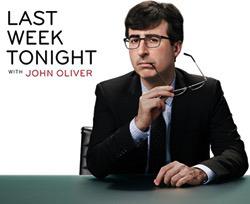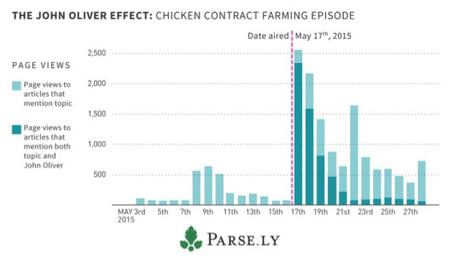
I wish I had coined the phrase: "The John Oliver Effect." I wish I had jumped onto the John Oliver bandwagon before this past June when I first wrote about it for Humor in America. I wish more people had read my post in June. Here is the link to it for those who want a second chance: John Oliver, FIFA, American Humor, and Topic Sentences. OK, the title is a bit long. This follow-up post is better since is shamelessly rides the crest of the "John Oliver Effect" wave. About 60 words into the post, and I have used it three times, including the title. I am seeking traction. John Oliver Effect. John Oliver Bounce.
The phrase was coined by Victor Luckerson for Time online (20 January 2015): How the 'John Oliver Effect' is Having a Real-Life Impact. At least I think he coined it. In any case, although he introduces it as "so-called John Oliver Effect," implying that someone has already "called" it, the internet has decided that he coined it based on the multitude of sources that use it and cite him as the originator. I'm in, too.
In a compelling article, Luckerson examines how reactions to particular sketches on Last Week Tonight have encouraged specific responses in the public square. In an especially useful post following the same idea as to Oliver's public impact, Sara Boboltz, for the Huffington Post ( HuffPost Comedy) discusses ten specific segments from the show: 10 Real-Life Wins for John Oliver. Although I certainly quibble with the tendency in both pieces to use "real-life," I will avoid a tedious existential argument and simply say that they both writers successfully capture a crucial transition in television comedy history. I am here to echo such claims again. The list of segments from Last Week Tonight with John Oliver that deserve substantive attention in the pubic sphere is growing. The show, in no uncertain terms, encourages and even demands responses from politicians, policy-makers, public figures, and, well, from all of us.
This follow-up post on the show reiterates my belief that the most important characteristic of Last Week Tonight with John Oliver is the writing. Writing comedy is serious business. In particular, the thesis-driven approach to satirical humor that the show promotes is deepening the dialogue on any of a number of issues, and it does so with great skill and, so far, substantive success. What Last Week Tonight is proving that American audiences, indeed, can have an attention span greater than amphibians, current polling on the presidential race notwithstanding. Moreover, humor is effective.
More and more viewers and critics are noticing. The show has just earned four Emmy nominations for 2015: for "Outstanding Variety Talk Show Series"; "Outstanding Picture Editing for a Variety Series"; "Outstanding Interactive Program"; and "Outstanding Writing for a Variety Series." It is the last one that has the most implications for the quality of the show and its long-term impact on American humor and satire. We will find out the results on the Emmys to air on Sep. 20th. Although the competition is formidable, the conclusion should be clear. Long form writing deserves its due.
In the much heralded-and very funny- Daily Show with Jon Stewart farewell episode, the brief banter between Stewart and Oliver was both funny and telling. The core joke, quite simply, was built around the definitive difference between the two shows and their approaches to humor and culture. Here is a link to the segment, wherein Oliver's part starts five minutes into the seven-minute clip: John Oliver on Jon Stewart's final Daily Show. The bit begins as Oliver goes on and on about his first day on set. Stewart's tries to get Oliver to be more brief in his narrative, saying, "We're gonna have to pick up the pace, just a smidgen." To that Oliver responds,
"No, no, no, no...we can't. When something's important, it's worth taking the time to discuss it in depth. I'm talking fifteen, eighteen, even twenty minutes, if necessary. Otherwise, what are you really doing?"
This is a direct reference to the writing style of Last Week Tonight with John Oliver, wherein the thesis-driven segments run , generally, 15-20 minutes. The comic but pointed rhetorical question is a good one for any politically conscious humor: "What are you really doing?"
Clearly, Last Week Tonight is accomplishing something substantive. Allie VanNest in Parse.ly (8 Sep 2015, Measuring the Impact of 'The John Oliver Effect' demonstrates a clear impact of Oliver's segment examining chicken farming. Here is a link to the segment on YouTube: .
VanNest includes a graph revealing the impact this particular segment had on public awareness. The data is not ambiguous here. VanNest acknowledges that the more seemingly obscure the subject is, the more easily the John Oliver Effect can be measured. Still, the graph below nonetheless offers a formidable indication of the potential of the approach that Last Week Tonight is taking.

I argued in the earlier piece, Last Week Tonight with John Oliver, though equally funny to any late-night peers, aspires to alter public debate in a much more clearly articulated manner than any of its predecessors. It is all in the thesis. Again, here is my advice to writing teachers: use John Oliver to teach argumentative writing. Everyone will win with this approach. Call it the John Oliver Effect. It may actually change things.
